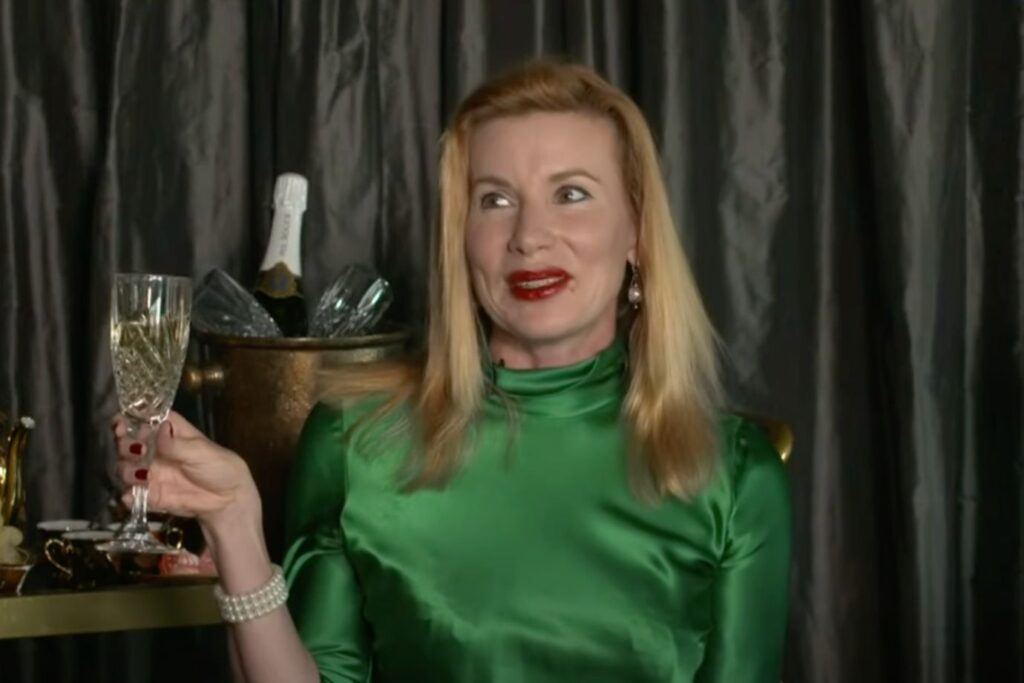The Ladies Lounge at the Museum of Old and New Art (MONA) will likely close after a tribunal hearing found the women-only space discriminated against a man who was refused entry.
On Tuesday, deputy president of the Tasmanian Civil and Administrative Tribunal (TASCAT) Richard Grueber published his decision, ruling in favour of NSW man Jason Lau.
Grueber also condemned the “inappropriate, discourteous and disrespectful” behaviour of artist Kirsha Kaechele and other women who attended the hearing in March, which he described as “some sort of performance”.
Here’s everything you need to know.
What’s the story?
In 2020, US-born artist Kirsha Kaechele opened the Ladies Lounge at the MONA, a space that contains special artworks, refreshments and even butlers to wait on visitors.
Importantly, the “conceptual artwork” was created for women only. Speaking to the ABC last month, Kaechele said “the rejection of men is a very important part of the artwork”.
But the extent to which the MONA could refuse entry for men to the Ladies Lounge was tested when NSW man Jason Lau visited the museum in April last year. Following his visit, he launched legal proceedings against Moorilla Estate, the parent company of MONA, alleging his was discriminated against.
In March 2024, eleven months after his visit, the Lau v Moorilla Estate case went before the TASCAT and was heard by deputy president Richard Grueber.
Appearing via video link, Lau made his case.
“I visited MONA, paid $35, on the expectation that I would have access to the museum, and I was quite surprised when I was told that I would not be able to see one exhibition, the Ladies Lounge,” he said.
“Anyone who buys a ticket would expect a fair provision of goods and services.”
What was the outcome?
The case called into question the application of Section 26 of Tasmania’s Anti-Discrimination Act 1998, which states: “A person may discriminate against another person in any program, plan or arrangement designed to promote equal opportunity for a group of people who are disadvantaged or have a special need because of a prescribed attribute.”
In other words, as Lau put it at the time, the law permits “positive discrimination, not negative discrimination”. In its case, Moorilla Estate argued the Ladies Lounge promotes “equal opportunity”, therefore Section 26 should be applied. Lau argued the contrary.
However, TASCAT ultimately found Lau was discriminated against, and deputy president Grueber said MONA has 28 days to cease the refusal of entry for men.
“Mr Lau is male. As he does not identify as a lady he was refused entry to the Ladies Lounge,” Grueber wrote in his decision.
“He had paid the full entry price for MONA but was not able to experience the artwork contained within the Ladies Lounge.
“The refusal to permit Mr Lau entry to the Ladies Lounge was direct discrimination.”
In his judgement, Grueber noted the “difficult relationship” art has with the law, “a system of rules regulating behaviour” in the interest of “good order and safety”.
“Art on the other hand may be intentionally derivative, subversive, provocative and anti-authoritarian,” Grueber wrote.
However “paradoxical” the case may seem, Grueber concluded the Ladies Lounge discriminates against those who do not identify as “ladies”.
What will happen to the Ladies Lounge?
Grueber’s decision means the MONA must include all visitors in the Ladies Lounge within the next 28 days.
However, in an interview with The Project last month, artist Kirsha Kaechele suggested that the Ladies Lounge would close if the TASCAT ruled in favour of Lau.
“The Ladies Lounge would have to close, because the requirement would be that it opens to men, and that’s not happening,” she said.
During the interview, Kaechele thanked Lau for taking the case to TASCAT.
“I love every moment of it… I’m extremely grateful to Mr Lau for the lawsuit because we get to exercise the argument, and I think it’s completely fascinating,” she said.
Simply Irresistible
There was one final point Grueber made in his ruling for the Lau v Moorilla Estate case.
It referred to Kaechele’s conduct during the one-day hearing, accompanied by around 20 other women, “dressed similarly to her conservative business style of similar colour”, Grueber wrote.
Throughout the trial, the women sat still, shifting their posture every few minutes “in unison in a coordinated manner”. Some, he noted, were “pointedly reading feminist texts” during the hearing.
At the conclusion of the hearing, the women left “in a single line in a slow march led by Ms Kaechele”, walking to the beat of Robert Palmer’s hit Simply Irresistible.
While he noted the conduct did not “disrupt or influence” the proceedings, Grueber criticised their conduct, which he described as “some sort of performance”, in his final decision.
“At the very least it was inappropriate, discourteous and disrespectful, and at worst contumelious and contemptuous,” Grueber wrote.
“If observed by Mr Lau it might well have been perceived by him as harassing and intimidatory.”



